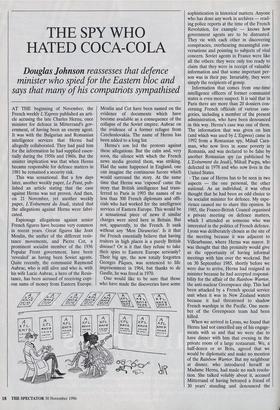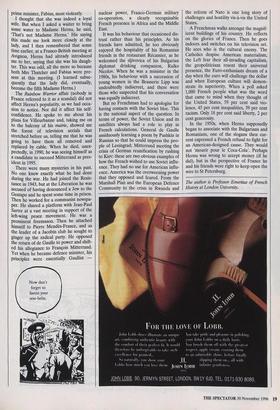THE SPY WHO HATED COCA-COLA
Douglas Johnson reassesses that defence
minister who spied for the Eastern bloc and says that many of his compatriots sympathised
AT THE beginning of November, the French weekly L'Erpress published an arti- cle accusing the late Charles Hernu, once minister for defence in Mitterrand's gov- ernment, of having been an enemy agent. It was with the Bulgarian and Romanian intelligence services that Hernu had allegedly collaborated. They had paid him for the information he had supplied essen- tially during the 1950s and 1960s. But the sinister implication was that when Hernu became responsible for defence matters in 1981 he remained a security risk.
This was sensational. But a few days later, another weekly paper, Le Point, pub- lished an article stating that the case against Hernu was not proven. And then, on 21 November, yet another weekly paper, L'Evenement du Jeudi, stated that the allegations against Hernu were fabri- cated.
Espionage allegations against senior French figures have become very common in recent years. Great figures like Jean Moulin, the unifier of the different resis- tance movements, and Pierre Cot, a prominent socialist member of the 1936 Popular Front government, have been 'revealed' as having been Soviet agents. Quite recently, the communist Raymond Aubrac, who is still alive and who is, with his wife Lucie Aubrac, a hero of the Resis- tance, has been accused of receiving copi- ous sums of money from Eastern Europe. Moulin and Cot have been named on the evidence of documents which have become available as a consequence of the collapse of the Soviet empire; Aubrac on the evidence of a former refugee from Czechoslovakia. The name of Hernu has been added to a long list.
Hernu's son led the protests against these allegations. But the calm and, very soon, the silence with which the French news media greeted them, was striking. Had the same happened in England, one can imagine the continuous furore which would surround the story. At the same time that Hernu was 'exposed' came the story that British intelligence had trans- ferred to Paris in 1993 the names of no less than 300 French diplomats and offi- cials who had worked for the intelligence services of Eastern Europe. This would be a sensational piece of news if similar charges were aired here in Britain. But not, apparently, to the French. It sank without any 'Mon Dieuseries'. Is it that the French essentially believe that having traitors in high places is a purely British disease? Or is it that they refuse to take their spies to Eastern Europe seriously? Their big spy, the now totally forgotten Georges Paques, was sentenced to life imprisonment in 1964, but thanks to de Gaulle, he was freed in 1970.
One would like to be sure that those who have made the discoveries have some sophistication in historical matters. Anyone who has done any work in archives — read- ing police reports at the time of the French Revolution, for example — knows how government agents are to be distrusted. They vie with each other in discovering conspiracies, overhearing meaningful con- versations and pointing to subjects of vital concern. Soviet agents in France were like all the others: they were only too ready to claim that they were in receipt of valuable information and that some important per- son was in their pay. Invariably, they were simply the recipients of gossip.
Information that comes from one-time intelligence officers of former communist states is even more suspect. It is said that in Paris there are more than 20 dossiers con- cerning French officials of various cate- gories, including a member of the present administration, who have been denounced in this way. Hemu's case was one of them. The information that was given on him (and which was used by L 'Express) came in 1992 from a Romanian spy, Mihail Cara- man, who now lives in some poverty in Romania, and was declared to be false by another Romanian spy (as publicised by Laenement du Jeudi), Mihail Pacpa, who defected in 1978 and who now lives in the United States.
• The case of Hernu has to be seen in two aspects — the one personal, the other national. As an individual, it was often thought that he had been an odd choice to be socialist minister for defence. My expe- rience caused me to share this opinion. In 1985, the Franco-British Council organised a private meeting on defence matters, which I attended as someone who was interested in the politics of French defence. Lyons was deliberately chosen as the site of the meeting because it was adjacent to Villeurbanne, where Hernu was mayor. It was thought that this proximity would give us the opportunity of having informal meetings with him over the weekend. But on 30 September 1985, shortly before we were due to arrive, Hernu had resigned as minister because he had accepted responsi- bility for the affair of the Rainbow Warrior, the anti-nuclear Greenpeace ship. This had been attacked by a French special service unit when it was in New Zealand waters because it had threatened to shadow French warships in the Pacific. One mem- ber of the Greenpeace team had been killed.
When we arrived in Lyons, we found that Hernu had not cancelled any of his engage- ments with us and that we were due to have dinner with him that evening in the private room of a large restaurant. We, a half-dozen or so Brits, agreed that we would be diplomatic and make no mention of the Rainbow Warrior. But my neighbour at dinner, who introduced herself as Madame Hernu, had made no such resolu- tion. She talked volubly about it, accused Mitterrand of having betrayed a friend of 30 years' standing and denounced the prime minister, Fabius, most violently.
.1 thought that she was indeed a loyal wife. But when I asked a waiter to bring some water to Madame Hernu, he said, 'That's not Madame Hernu.' His saying this made me look more closely at the lady, and I then remembered that some time earlier, at a Franco-British meeting at Avignon, Hernu had already introduced me to her, saying that she was his daugh- ter. This was odd, all the more so because both Mrs Thatcher and Fabius were pre- sent at this meeting. (I learned subse- quently that the lady did, eventually, become the fifth Madame Hernu.) The Rainbow Warrior affair (nobody in France referred to it as a scandal) did not affect Hemu's popularity, as we had occa- sion to notice. Nor did it affect his self- confidence. He spoke to me about his plans for Villeurbanne and, taking me on to the balcony of his mairie, showed me the forest of television aerials that stretched before us, telling me that he was going to have them all removed and replaced by cable. When he died, unex- pectedly, in 1990, he was seeing himself as a candidate to succeed Mitterrand as pres- ident in 1995.
There were many mysteries in his past. No one knew exactly what he had done during the war. He had joined the Resis- tance in 1943, but at the Liberation he was accused of having denounced a Jew to the Gestapo and he spent some time in prison. Then he worked for a communist newspa- per. He shared a platform with Jean-Paul Sartre at a vast meeting in support of the left-wing peace movement. He was a prominent freemason. Then he attached himself to Pierre Mendes-France, and as the leader of a Jacobin club he sought to ginger up the radical party. He opposed the return of de Gaulle to power and shift- ed his allegiance to Francois Mitterrand. Yet when he became defence minister, his principles were essentially Gaullist — nuclear power, Franco-German military co-operation, a clearly recognisable French presence in Africa and the Middle East.
It was his behaviour that occasioned dis- trust rather than his principles. As his friends have admitted, he too obviously enjoyed the hospitality of his Romanian friends in the restaurant Recamier, as he welcomed the sljivovica of his Bulgarian diplomat drinking companion, RaiIco Nicolov. When he was a minister in the 1980s, his behaviour with a succession of young women in the Brasserie Lipp was undoubtedly indiscreet, and there were those who suspected that his conversation was equally indiscreet.
But no Frenchman had to apologise for having contacts with the Soviet bloc. This is the national aspect of the question. In terms of power, the Soviet Union and its satellites always had a role to play in French calculations. General de Gaulle assiduously learning a poem by Pushkin in Russian so that he could impress the peo- ple of Leningrad; Mitterrand meeting the crisis of German reunification by rushing to Kiev: these are two obvious examples of how the French wished to use Soviet influ- ence. They had no use for American influ- ence. America was the overweening power that they opposed and feared. From the Marshall Plan and the European Defence Community to the crisis in Rwanda and the reform of Nato is one long story of challenges and hostility vis-a-vis the United States.
A Frenchman walks amongst the magnif- icent buildings of his country. He reflects on the glories of France. Then he goes indoors and switches on his television set. He sees who is the cultural enemy. The Catholics despise American materialism, the Left fear their all-invading capitalism, the geopoliticians resent their universal presence, the Euro-enthusiasts dream of a day when the euro will challenge the dollar and when European culture will demon- strate its superiority. When a poll asked 1,000 French people what was the word that came to mind when they thought of the United States, 59 per cent said vio- lence, 45 per cent inequalities, 39 per cent racism. Only 18 per cent said liberty, 2 per cent generosity.
In the 1950s, when Hernu supposedly began to associate with the Bulgarians and Romanians, one of the slogans then cur- rent expressed a French refusal to fight for an American-designed cause. They would not `mourir pour le Coca-Cola'. Perhaps Hernu was wrong to accept money (if he did), but in the perspective of France he and his friends were right to keep open the wire to St Petersburg.
The author is Professor Emeritus of French History at London University.



















































































 Previous page
Previous page